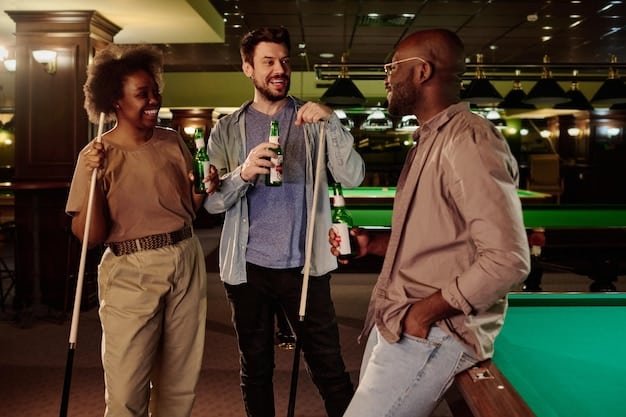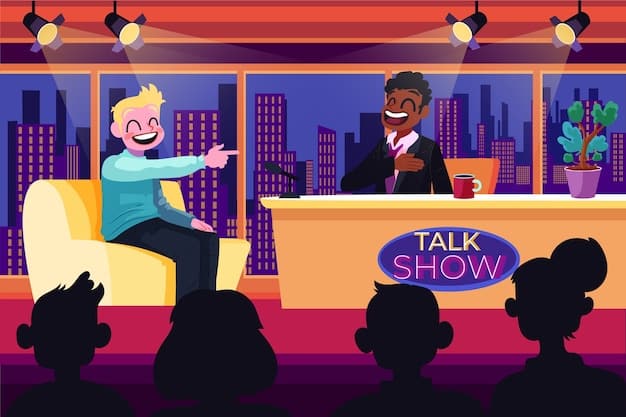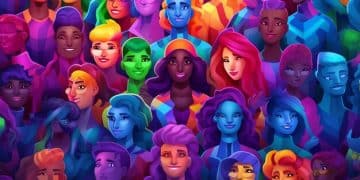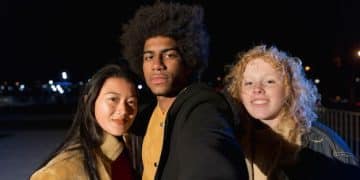The Latest Trends in American Stand-Up Comedy: Who’s Hot and Why?

The Latest Trends in American Stand-Up Comedy: Who’s Hot and Why? explores the evolving landscape of American humor, spotlighting innovative comedians, diverse voices, and the shifting cultural perspectives shaping contemporary stand-up.
American stand-up comedy is constantly evolving, reflecting the ever-changing cultural landscape. Understanding the latest trends in American stand-up comedy: who’s hot and why? requires looking at several factors, from diverse representation to innovative comedic styles.
The Rise of Diversity and Inclusion in Comedy
One of the most significant shifts in American stand-up is the increased representation of diverse voices. Comedians from various ethnic, racial, and gender backgrounds are finally getting the spotlight they deserve, bringing fresh perspectives and experiences to the stage.
More Diverse Voices
The comedy scene is seeing a surge in comedians who represent previously marginalized groups. This includes increased visibility for women, people of color, LGBTQ+ individuals, and disabled performers.
- Representation Matters: Diverse comedians offer unique insights and challenge traditional comedic norms.
- Breaking Stereotypes: They dismantle harmful stereotypes through humor, promoting understanding and empathy.
- Expanding Audiences: Their appeal extends to broader audiences seeking relatable and authentic content.

This shift is not just about political correctness; it’s about reflecting the true diversity of American society. These comedians often tackle complex social issues with wit and intelligence, making audiences laugh while also prompting them to think.
Comedy Addressing Social Issues Head-On
Today’s comedians are not afraid to tackle controversial topics. Many are using their platforms to address social and political issues, creating comedy that is both funny and thought-provoking.
Political Satire
Political satire has always been a part of stand-up, but it’s become even more prevalent in recent years. Comedians are dissecting current events, holding politicians accountable, and providing commentary on the state of the world.
- Topical Humor: Comedians like Trevor Noah and Hasan Minhaj have built their careers on sharp political satire.
- Impactful Commentary: Their jokes often spark discussions and raise awareness about important issues.
- Engaging Audiences: By addressing real-world problems, they connect with audiences on a deeper level.
Social commentary also delves into issues like economic inequality, healthcare, and climate change. Many comedians use personal anecdotes and observational humor to make these topics more accessible and relatable.
The Evolution of Stand-Up Format: Beyond the Mic
Stand-up comedy is no longer confined to traditional formats. Comedians are experimenting with different styles and platforms, pushing the boundaries of what stand-up can be.
Improv and Sketch Integration
Many comedians are incorporating elements of improv and sketch comedy into their acts. This blend of styles adds spontaneity and theatricality to their performances.
Stand-Up Specials on Streaming Platforms
Streaming services like Netflix, Amazon Prime, and HBO Max have become major players in the comedy world. They offer comedians a platform to reach global audiences with their stand-up specials.
- Increased Exposure: Streaming specials have boosted the careers of many up-and-coming comedians.
- Creative Freedom: Comedians have more control over the production and distribution of their content.
- Diverse Content: Streaming platforms are investing in a wider range of comedic styles and voices.

The rise of streaming has allowed comedians to experiment with different formats, such as longer sets, thematic shows, and even comedy documentaries.
Comedians Embracing Vulnerability and Personal Storytelling
Audiences are increasingly drawn to comedians who are willing to be open and honest about their personal struggles. Vulnerability has become a powerful tool for connecting with viewers.
By sharing their stories, comedians create a sense of intimacy and authenticity. This allows them to build deeper connections with their audiences and create comedy that is both funny and emotionally resonant.
Mental Health Awareness
Many comedians are using their platforms to raise awareness about mental health issues. They are sharing their own experiences with anxiety, depression, and other mental health conditions, helping to reduce stigma and encourage others to seek help.
The Power of Online Platforms: TikTok, YouTube, and Beyond
Online platforms have become essential tools for comedians to reach new audiences and build their brands. TikTok, YouTube, and other social media platforms allow comedians to create and share short-form comedy content, reaching millions of viewers worldwide.
- Viral Potential: A single video can go viral, launching a comedian’s career overnight.
- Direct Engagement: Comedians can interact directly with their fans, building a loyal following.
- Creative Freedom: Online platforms allow comedians to experiment with different styles and formats.
Many comedians are also using online platforms to host live streams, Q&A sessions, and other interactive events. This allows them to connect with their fans in real time and build a community around their comedy.
Stand-Up Comedy on TikTok and Instagram
Shorter formats translate better to platforms like TikTok and Instagram Reels. Comedians are using these platforms to create bite-sized comedy snippets that can quickly go viral.
New Voices in American Stand-Up Comedy: Who’s Hot?
Identifying the “hot” comedians in American stand-up is subjective, but several names frequently appear on lists and in discussions about emerging talent.
A List of Hot Figures
These rising stars are known for their innovative styles, unique perspectives, and ability to connect with audiences on a personal level. Here are some names to watch in the current stand-up scene:
- Ayo Edebiri: Known for her sharp wit and relatable humor.
- Shane Gillis: Famous for his dark and edgy comedic style.
- Taylor Tomlinson: Famous for her relatable humor and storytelling to bring up uncomfortable topics.
| Key Point | Brief Description |
|---|---|
| 🎤 Diverse Voices | More comedians from diverse backgrounds are gaining prominence. |
| 🗣️ Social Commentary | Comedians are tackling social and political issues directly in their acts. |
| 📱 Online Platforms | TikTok, YouTube, and Instagram are vital for reaching new audiences. |
| 🎭 Format Evolution | Stand-up is blending with improv, sketch, and streaming specials. |
Frequently Asked Questions (FAQs)
▼
Increased diversity, social commentary, the use of online platforms, and comedians being more open about personal issues are among the biggest trends in stand-up comedy today.
▼
Comedians use platforms like TikTok, YouTube, and Instagram to share short clips, sketches, and promote tour dates, connecting directly with fans and reaching new audiences.
▼
Some rising stars include Ayo Edebiri (known for wit and relatable humor), Shane Gillis (edgy comedy), and Taylor Tomlinson, praised for storytelling to convey uncomfortable realities.
▼
Because diverse comedians offer unique perspectives, challenge norms, dismantle stereotypes, and broaden the appeal of comedy to reflect the true diversity of American society.
▼
Streaming services provide comedians greater exposure, creative freedom, and a platform to reach global audiences with their stand-up specials, changing the way comedy is consumed.
Conclusion
American stand-up comedy is a dynamic and evolving art form, reflecting the changing values and concerns of society. From increased diversity and social commentary to new formats and online platforms, the comedy scene is constantly innovating and challenging conventions. The latest trends highlight a vibrant and inclusive community that continues to push boundaries and offer fresh perspectives.





